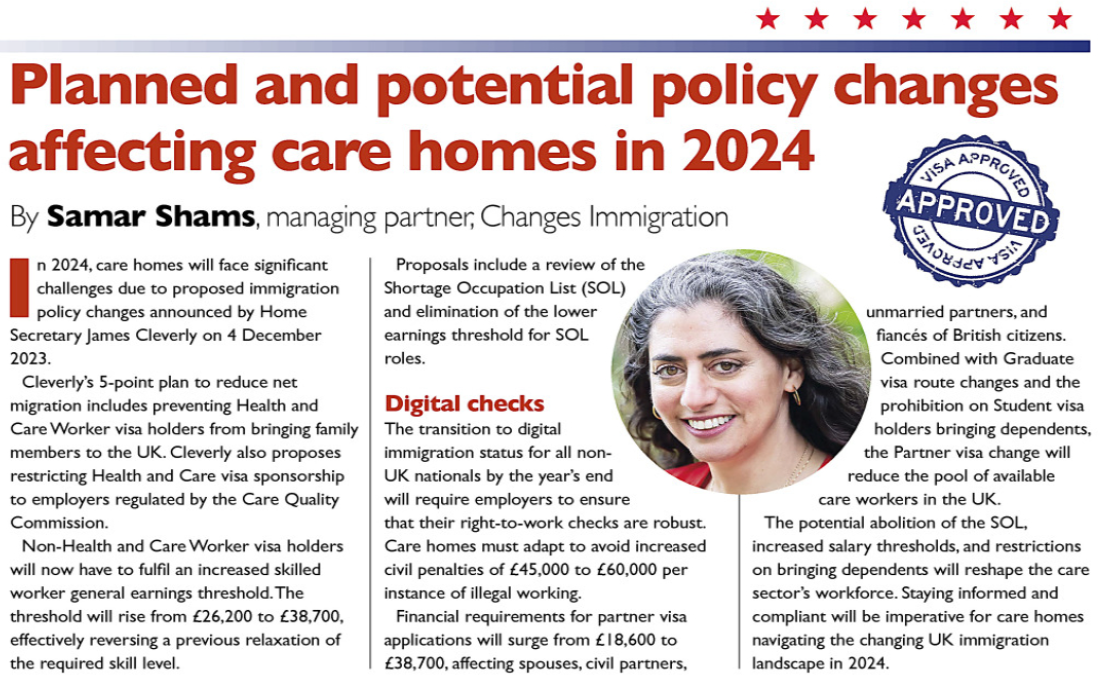The Migration Advisory Committee (MAC)’s 2024 rapid review of the Immigration Salary List includes several warnings to the Government to consider the effects of its rapid-fire announcements of immigration changes. How did we get here?
The Immigration Salary List and the ‘Points-Based System’
Way back in September 2019, the Government asked the MAC whether it should shoehorn a points calculation into the salary requirements for Skilled Workers. The MAC said no, on the basis that there would be too much uncertainty for employers and that the system would be difficult to navigate. In December 2020, the Government did it anyway.
In order to gain the requisite points for salary for a Skilled Worker role, a sponsor must meet the higher of the ‘general salary threshold’ and the ‘going rate’ for the specific occupation. The general salary threshold for the Skilled Worker route is now £38,700. Points can be gained for specific characteristics that effectively discount the ‘general salary threshold’ and the ‘going-rate’. The points calculation to determine a Skilled Worker’s salary requirement is the only points calculation in the UK’s ‘Points-Based’ immigration system.
In 2020, the MAC also asked the Government to consider what the point of the Immigration Salary List is. The Government did not answer this question but, under the system introduced in December 2020, a role’s inclusion on the Immigration Salary List is a characteristic for which points can gained. The way this works in practice is that inclusion on the Immigration Salary List affords a 20% discount on the general salary threshold for the Skilled Worker category. Previously, the Immigration Salary List also afforded a discount on the ‘going rate’ salary threshold.
New immigration policies
In its 2023 review of the Immigration Salary List the MAC recommended abolishing the Immigration Salary List discount for occupation-specific going rates and basing going rate salary thresholds on more up-to-date data. These recommendations have been taken up, including the renaming of the list, which used to be called the Shortage Occupation List.
The MAC makes clear in its rapid review of the Immigration Salary List that its 2023 recommendations were based on immigration policies in effect at the time of that review. The MAC warns that Government’s subsequent adoption of the MAC’s recommendations, within a framework of other policy changes on which the MAC was not consulted, has incoherent effects.
In particular, the Government’s rash salary threshold increases in April 2024 have unintended consequences when combined with the changes to the Immigration Salary List:
- The Government increased the general salary threshold from £26,200 to £38,700 except for Health & Care worker (H&CW) roles;
- For H&CW roles, a general salary threshold of £29,000 applies; and
- The Government increased occupation-specific salary thresholds from the 25th percentile to the 50th percentile except for H&CW roles. A salary threshold set at the 25th percentile means that the salaries for 25% of roles in that occupation are lower than the threshold and the salaries for 75% of roles in that occupation are higher than the threshold. A salary threshold set at the 50th percentile (or ‘median’) means that the salaries of 50% of roles in that occupation are lower than the threshold and 50% are higher.
The Government retained the 20% discount on the general salary threshold for roles on the Immigration Salary List. As applied to the increased general salary thresholds, the discounted general salary threshold for roles on the Immigration Salary List is £30,960, or £23,200 for H&CW roles.
Unintended consequences
In its 2024 rapid review of the Immigration Salary List, the MAC states that it needs to revisit its previous recommendation to abolish the list in light of the Government increasing the general salary threshold.
The MAC warns the Government that the salary threshold increases result in unintended consequences:
- The Skilled Worker route is irrelevant for ‘medium skill level’ occupations. The MAC expects that the Skilled Worker route will be used predominantly for graduate-level occupations as the levels of pay may be out of reach for many Regulated Qualification Framework level 3-5 occupations, other than roles exempted from the salary threshold increases;
- Relying on the ‘new entrant’ discount for those aged 26 and under, Students and Graduate visa holders, may be the only way for many UK employers to recruit migrant workers on the Skilled Worker route. The new entrant discount consists of a 20% discount on the general salary threshold and a 30% discount on the occupation-specific going rate threshold;
- When the MAC recommended abolition of the 20% going rate discount for roles on the Immigration Salary List in November 2023, its goals were to avoid both the undercutting of domestic workers’ salaries and the exploitation of migrants. Abolition of the going rate discount does not make sense where the government is increasing the occupation-specific salary thresholds to the 50th percentile for non-H&CW occupations. In a 50th percentile going rate scenario, the going rate discount would only allow employers to pay less than the median salary so would not undercut domestic workers or facilitate the exploitation of migrants; and
- Perhaps most alarmingly, the MAC notes “The government appears to be exempting itself from any salary thresholds which would require an increase in pay for publicly funded workers and therefore an increase in funding for . . . public services. This widening divide poses an increased risk of exploitation for lower-paid occupations, such as care workers, as the gap between salary thresholds for private and publicly funded occupations becomes larger.”
Again and again, the MAC states in its 2024 rapid review of the Immigration Salary List,“We encourage the government to consider this impact of the rule changes.”
What does the Immigration Salary List look like now?
The MAC excluded from its Immigration Salary List recommendations 15 occupations that have a median salary of above the discounted general salary threshold: where the occupation-specific threshold is above the general threshold, a role would not receive any salary discount from being added to the Immigration Salary List because sponsors would have to meet the higher occupation-specific salary threshold.
For example, an occupation heavily relied on by UK employers in the tech industry, falling under Standard Occupational Classification code ‘2134 Programmers and software development professionals’ is no longer on the Immigration Salary List because its updated occupation-specific going rate of £49,400 is higher than the general salary threshold. A sponsor must pay the higher of the applicable general salary threshold and the going rate, so including Standard Occupational Classification code ‘2134 Programmers and software development professionals’ on the Immigration Salary List would be pointless.
The same analysis applies to another Standard Occupational Classification code, ‘2133 IT business analysts, architects and systems designers’.
The MAC also recommended roles for inclusion that it did not recommend previously because the general salary threshold increase means that the roles might otherwise not be able to use the Skilled Worker route. The MAC focussed on recommending roles for which the 50th percentile occupation-specific salary level is below the proposed general threshold of £38,700, but above the discounted general salary threshold of £30,960. Including these roles on the Immigration Salary List allows employers to sponsor Skilled Workers at the occupation-specific salary levels.
The Government reduced the UK-wide ISL from 51 roles to the following 17 SOC 2020 roles in April 2024.
| SOC code 2020 | Description* | Relevant salary threshold |
| 2112 | Biological scientists | £41,900 |
| 2115 | Social and humanities scientists – only archaeologists | £36,400 |
| 2142 | Graphic and multimedia designers | £30,960 |
| 3111 | Laboratory technicians | £30,960 |
| 3212 | Pharmaceutical technicians | £30,960 |
| 3411 | Artists | £32,900 |
| 3414 | Dancers and choreographers | £30,960 |
| 3415 | Musicians | £32,900 |
| 3416 | Arts officers, producers and directors | £37,500 |
| 5119 | Agriculture and fishing trades – only in the fishing industry | £30,960 |
| 5213 | Welding trades – only high integrity pipe welders | £31,700 |
| 5312 | Stonemasons and related trades | £31,000 |
| 5313 | Bricklayers | £30,960 |
| 5314 | Roofers, roof tilers and slaters | £31,000 |
| 5316 | Carpenters and joiners | £30,960 |
| 5319 | Construction and building trades not elsewhere classified –only “retrofitters” | £30,960 |
| 6129 | Animal care services occupations not elsewhere classified – only “racing grooms”, “stallion handlers”, “stud grooms”, “stud hands”, “stud handlers” and “work riders” | £30,960 |
| 6135 | Care workers and home carers | £23,200** or £30,960 |
| 6136 | Senior care workers | £23,200** or £30,960 |
| 9119 | Fishing – only experienced deckhands on large vessels | £30,960 |
* SOC code descriptions are simplified here. For advice, please contact us at Changes Immigration.
** Where H&CW requirements are met.
A handful of additional roles are included on the Immigration Salary List for Scotland.
In respect of the inclusion of SOC code ‘2112 Biological Scientists’ on the Immigration Salary List, the MAC seems to have relied on an occupation-specific salary threshold of £37,710 when recommending inclusion. The current SOC code 2112 occupation-specific salary threshold of £41,900 renders inclusion of the occupation on the Immigration Salary List pointless.
Purpose of the Immigration Salary List
The MAC has repeated its request that the Government to confirm the purpose of the Immigration Salary List. Should it facilitate filling shortages with overseas labour? Should it support policies and sectors to benefit UK society regardless of shortages? The MAC has offered to make recommendations to the government on what the benefits of the Immigration Salary List should be and states that these must be agreed before the Government commissions the anticipated, more comprehensive review of the Immigration Salary List for future implementation.
Even if the salary threshold increases and abolition of the discount further the Government’s stated goal of reducing net migration, the MAC’s recent report reflects that they comprise careless policy-making. It is evident that the Government failed to consider the consequences of its proposed policies, in its rush to be seen to be doing things in advance of the general election expected later this year.
Original publication date: 11 March 2024
Last updated: 18 May 2024








